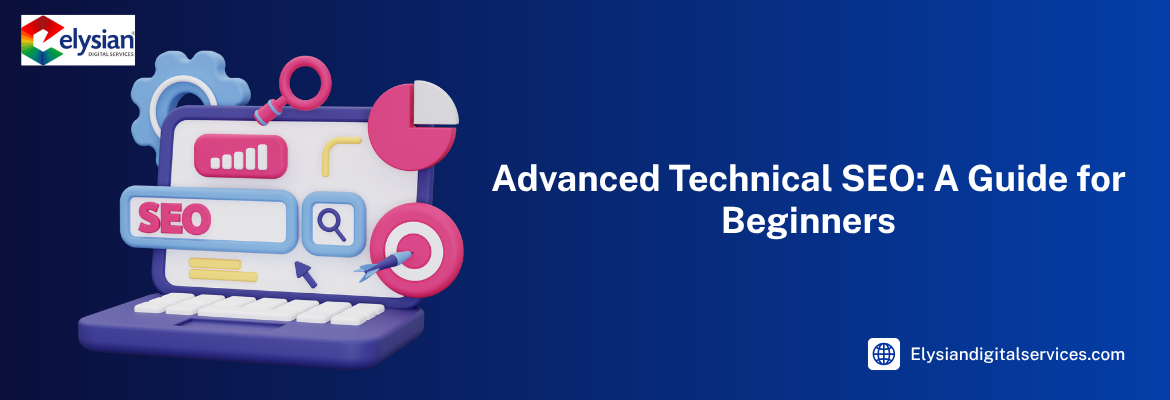Table of Contents
ToggleAdvanced Technical SEO: A Guide for Beginners
Looking to master technical SEO? This SEO guidebook covers everything from technical SEO basics to advanced strategies. Learn how to optimize your website structure, improve site speed, fix crawl errors, and boost rankings. Our technical SEO guide provides a step-by-step checklist, answers common SEO questions, and helps businesses worldwide and locally get more traffic, leads, and revenue. With 7+ years of experience, Elysian Digital Services shows you proven techniques to improve search performance, enhance user experience, and achieve lasting results.
What is Advanced Technical SEO and Why is it Important?
Technical SEO focuses on the backend aspects of a website—things like site speed, indexing, structured data, and security. While content and backlinks often get the spotlight, advanced technical SEO ensures your website is error-free and fully optimized for better search rankings.
Why Should You Care?
Faster websites = Better user experience & lower bounce rate
Proper indexing = Ensures your content is visible to search engines
Mobile optimization = Essential for ranking in today’s mobile-first world
Structured data = Helps search engines understand your content
With these technical SEO tips, even beginners can follow this SEO guide for beginners to enhance search visibility, improve performance, and keep users happy.
What is SEO in Technical Terms?
When people say “SEO tech,” they’re referring to search engine optimization practices that involve website infrastructure and coding. This includes:
Crawling & Indexing– Ensuring search engines can access and understand your content.
Mobile Friendliness– Making sure your website works seamlessly on mobile devices.
Site Speed & Performance– Optimizing loading times for a better user experience.
Security– Implementing HTTPS and other security measures.
Structured Data– Adding schema markup to help search engines categorize content correctly.
Is Technical SEO Difficult?
Not necessarily! While it involves a bit of technical know-how, many technical SEO tools simplify the process. Plus, once you understand the basics, making small tweaks can lead to big improvements in rankings.
Common Myths About Technical SEO
- You need to be a developer.” Nope! Many SEO guides make technical SEO beginner-friendly.
- It’s a one-time fix.” Not true! SEO is ongoing; search engines constantly update their algorithms.
- It doesn’t impact rankings.” Wrong again! Google favors well-optimized sites.
How Can You Improve Your Technical SEO?
Ready to level up your SEO website? Follow these key steps:
- Audit Your Website – Use tools like Google Search Console and Screaming Frog to find technical issues.
- Fix Broken Links – Remove or redirect 404 errors to keep your site clean.
- Optimize Speed – Compress images, enable caching, and use a Content Delivery Network (CDN).
- Improve Mobile Usability – Ensure your site is responsive and mobile-friendly.
- Secure Your Site – Implement HTTPS for better trust and rankings.
- Enhance Structured Data – Use schema markup to help search engines understand your content.
- Fix Duplicate Content Issues – Use canonical tags to avoid ranking confusion.
How to Advance Technical SEO Step by Step?
Mastering technical SEO for beginners doesn’t have to be overwhelming. Follow this roadmap:
Step 1: Ensure Search Engines Can Crawl & Index Your Site
- Check your robots.txt file.
- Submit an XML sitemap to Google Search Console.
Step 2: Optimize Site Speed & Performance
- Minimize CSS, JavaScript, and HTML.
- Enable lazy loading for images.
Step 3: Mobile Optimization
- Test your site using Google’s Mobile-Friendly Test.
- Use responsive design for seamless mobile viewing.
Step 4: Secure Your Site
- Use HTTPS instead of HTTP.
- Implement SSL certificates.
Step 5: Implement Structured Data
- Use Google’s Structured Data Markup Helper to generate schema markup.
- Add rich snippets to boost visibility.
Technical SEO Checklist
Here’s a quick SEO guide to keep your site in top shape:
Crawlability & Indexing
Mobile-Friendly Design Fast Loading Speed
Secure HTTPS Connection
Optimized Images & Media
Structured Data
Internal Linking
Fix Broken Links
Reduce Redirect Chains
Canonical Tags for Duplicate Content
What is the Fundamental of Technical SEO?
The foundation of technical SEO in digital marketing lies in these core principles:
- Accessibility: Ensure search engines can crawl and index your pages.
- Performance: Faster loading times keep users and search engines happy.
- User Experience: A well-structured, error-free site keeps visitors engaged.
- Security: HTTPS and secure hosting build trust and protect user data.
Boost Your Website Today!
Mastering technical SEO for beginners isn’t about complex coding it’s about understanding how your website functions behind the scenes. This technical SEO tutorial helps you improve site performance, fix crawl issues, and enhance search visibility. From structured data to mobile optimization, every technical improvement strengthens your site’s foundation and ranking potential.
Keep exploring technical SEO blogs, stay updated with the latest best practices, and make regular audits a habit. The more technically optimized your website is, the more trust and visibility you’ll gain online.
If you’re ready to boost your performance and simplify your SEO journey, Elysian Digital Services can guide you every step of the way with proven strategies and expert insights. Start applying these technical SEO tips today optimize, analyze, and grow your website with confidence.
FAQs
1. What are the best technical SEO tools?
Some must-have tools include Google Search Console, Screaming Frog, SEMrush, Ahrefs, and GTmetrix.
2. How often should I check my site’s technical SEO?
At least once a month! Regular audits ensure you catch and fix issues before they impact rankings.
3. Does technical SEO affect local SEO?
Absolutely! A technically optimized site improves rankings for local searches, making it easier for customers to find your business.
